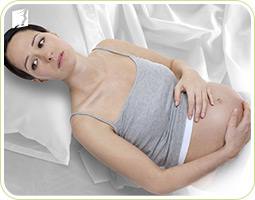
Short periods are very common and most women report having at least one shortened cycle at some point during their lifetimes. Short periods also tend to be quite common during puberty and the time surrounding menopause, when the body faces hormonal change.
Naturally, every woman has a different cycle, so a short period for one woman may be normal for another. If periods are consistently short with minimal menses, then it is called hypomenorrhea, a medical condition that may signify something more serious and should be discussed with a doctor.
In order to gain a better understanding of the menstrual cycle, it can be helpful to understand why short periods happen, and also how to treat them. Continue reading to learn all about short periods.
About Short Periods
During the menstrual cycle, most women can expect to bleed for about 3 to 5 days, or even 6 or 7 days. Sometimes, a period can last for less time, such as 1 to 2 days, with very little bleeding. Then it is known as a short period.
A short period once in a while is nothing to worry about, especially in young women just beginning menstruation and in older women beginning menopause. This can be attributed to changes in hormone levels that mark these changes. In other cases, shortened periods may be the result of stress or as a side-effect of hormonal birth control. In only a few cases are short periods worrisome, and this is only if they are consistently short with minimal bleeding.
Sometimes, there is a specific medical condition that causes short periods. Continue reading to learn more about the causes of short periods.
Short Periods Causes
There are two main causes for short periods: hormonal imbalance and lifestyle factors. As said above, short periods are common for women going through major life stages, such as puberty or the beginning of menopause. In both of these major life stages, ovulation does not occur regularly, and the walls of the uterus don't thicken enough to create a large amount of menses. This is due to changes in hormone levels -hormonal imbalance- that mark these life stages.

Sometimes, a short period can be caused by some lifestyle factors, such as stress. Stress can be related to events in a woman's life, such as finals week at school, a busy time at work or familial and relationship difficulties. Stress can also be caused by chemical imbalance in the brain, related to depression, anxiety, and other psychological distress. In all cases, stress causes hormonal changes that may affect ovulation and therefore affect the menstrual cycle.
Other Short Periods Causes
Short periods can also occur as a result of hormonal contraception, such as Depo-Provera, hormonal intrauterine devices (IUDs), oral birth control pills and implants. All of these birth control measures slightly alter the hormone levels in a woman's body, resulting in smaller amounts of menses. Similarly, any of the following medical conditions can lead to short periods:
Asherman's syndrome. This condition causes scarring in the uterus and interferes with production of menses.
Polycystic ovary syndrome (POS). This condition involves hormonal imbalance resulting from cysts in the ovaries. POS causes irregular or lack of menstruation, obesity, and fertility problems.
Low body fat. Because fat cells produce small amounts of estrogen, a very low level of body fat can create low levels of estrogen and thus a hormonal imbalance. This is particularly common in women who struggle with eating disorders.
Because short periods are related to ovulation, you may wonder about how short periods affect your fertility. Continue reading to learn about short periods and fertility.
Short Periods and Fertility

An occasional short period does not impact fertility. However, hypomenorrhea and the related medical conditions may include fertility problems due to hormonal imbalance or other specific cause.
To understand more about short periods and their relation to fertility, it can be helpful to talk with a doctor to determine whether there is an underlying condition. Continue reading to learn more about diagnosing of short periods.
Short Periods Diagnosis
Diagnosing conditions that relate to hypomenorrhea usually involve testing for hormonal imbalance and checking the inside of the uterus for scarring related to Asherman's Syndrome. Tests include:
Blood test. Blood can be tested to see whether there is a hormonal imbalance. This test is particularly effective in determining whether there are elevated levels of androgens, associated with polycystic ovary syndrome.
Ultra sonogram. This test involves examining the inside of the uterus to see if there is scarring or other problems with the tissue inside the uterine walls.
MRI. This test is useful in seeing the entire reproductive system to rule out other conditions or to check for cysts and tumors.
Treatment will depend upon the underlying condition. That is why it is important to seek medical attention if you are experiencing consistently shortened menstruation. Continue to reading to learn more about short periods treatments.
Short Periods Treatments

Treating short periods will depend on whether there is an underlying condition. If the cause is related with some lifestyle factor, for examples stress, then some lifestyle changes may be necessary. Relieving stress is an important part of a healthy lifestyle, and can include any activity that is enjoyable or relaxing.
If early periods are related to hormonal changes, then it can be most beneficial to seek alternative treatments or drugs that address these imbalances. Treatment is usually most effective when coupled with lifestyle changes to promote overall health. If there is an underlying medical condition, then other treatment may be necessary.
As a way of treating early periods, most experts agree that a combination of lifestyle changes and alternative medicine is the safest and most effective approach. Click the following link to learn all about treatments for early periods.
Sources
- Feig, Robert L. and Nicole C. Johnson. First Aid for the Obstetrics and Gynecology Clerkship.
- Perimenopause. National Women's Health Information Center. http://www.womenshealth.gov/faq/perimenopause.cfm. Accessed July 3, 2012.
- Casper RF. Clinical manifestations and diagnosis of menopause. http://www.uptodate.com. Accessed Aug 3, 2010.
- Practice Committee of the American Society for Reproductive Medicine. The menopausal transition. Fertility and Sterility. 2008;90:S61.
